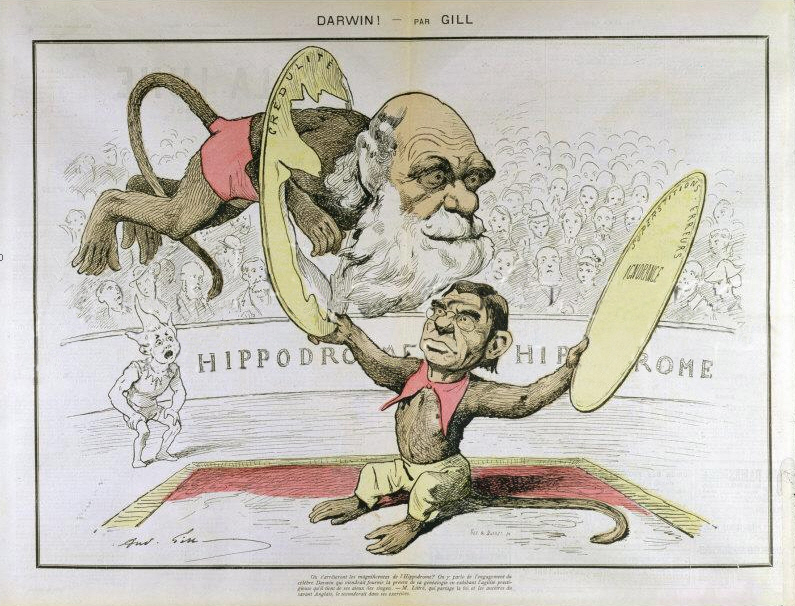How did the creatures of this world — we will confine our inquiry to planet Earth for the moment — come to be, in the dimension of Time?
Reader, beware! There are Neo-partisans all around you. The Neo-Darwinians are the first bunch to whom I will call your attention, for they infest “settled science.” Behind them lies Darwin himself, and all his Neo-Newtonian kind. There were Neo-Empiricists and Neo-Rationalists making up Newton’s train: the foot soldiers of Sir Francis Bacon and René Descartes. And Nominalists Neo’d before that.
The issue, for anyone who wishes to remain allied with God, if only to the point of granting His existence, is to defend the truth. Aristotle did this, in the biological treatises that are among his least studied works in our universities and labs. He expresses amazement that his predecessors did not grasp the fact of teleology.
The universe, including the parts of the universe, and so the parts of animals and much smaller things, behave in a manner that shows purpose. This is the rule in the universe we live in, wherever we explore. Even “an acorn” knows what it is doing, as it turns into a tree. If it is eaten by a voracious pig, its purpose becomes extrinsic; but the pig knew what it was doing.
To imagine that any creature is purposeless, is to presume mightily. It is to make a casual display of vulgarity, by imposing only one’s extrinsic purposes on it.
It is, to get back to Darwin, to imagine that mechanisms surround us on every side, and that they ultimately invented themselves. For even Darwin cannot escape teleology, although his conception of it is very dry.
Descartes distinguished spirit from matter, to make a place for consciousness, freedom, God, and so forth. He was fighting a rearguard action on behalf of the Jesuits; it wasn’t going well. The Neo-Cartesians gave up on metaphysical dyarchy with unseemly haste. For a Neo, any Neo, nature is a machine, that operates by chance, until entropy destroys it. Any other view is rejected, as old hat.
The world, after Descartes, and Bacon, would be pure mechanism; a machine, only to be fixed with spare parts. At every attempt to insert a Holy Will into it, somewhere, there are Neos waiting to slap us down again.
In the History of Animals and his other biological works, Aristotle shamelessly advances an account of the world in anticipatory defiance of Darwinian dogma. A creature is a unity of matter and form. It exists for a purpose, which may be unknown, but is usually obvious. The simpler the creature, the easier to guess – rightly or wrongly.

Aristotle, who, like Plato and the other Greek philosophers, lacked a university degree, was also not a credentialled biologist. Indeed, his biological works are universally ignored today, except by the odd eccentric. He did not even consider himself a scientist, but rather, a gentleman, who observed things by habit. He had no equipment, so depended upon his own senses, such as the sense of sight. He probably needed glasses.
He, too, would have taken a kick at Darwin. But first he would have scoured Darwin’s works, for signs of anything he had missed. He wouldn’t have taken kindly to the mechanistic inferences. He had already shown how irritable he could be, with those Greeks who neglected the rudiments of nature.
Indeed, he was even a little miffed with Plato, for jumping the gun, in assigning reality to implausible forms.
The parts of an animal are interdependent forms, presenting a little theater of purposeful actions. We know this about creatures because we are creatures ourselves. There are unbelievably complex internal relations, and externally we pass beyond what can be seen. We may be subject to the influence of others, but within, we are an “I” – absolutely discrete. We are born, grow, deteriorate, die. Only in death are we fully transformed into a body. Until then, we are a body-and-soul.
To understand a creature, for instance a creature such as my reader, we must deal with both. Any attempt to explain the body, by matter alone, is a misrepresentation. And what is true of my reader, is also true of an earthworm.
Darwin did not use, or even like, the word “evolution.” But via Herbert Spencer, it came to sell his goods. Darwin could sell only natural selection, but it had its own subsidiary market. It keeps being revived, and will be, because it answers to the human want for “just so” stories. Adaptation though natural selection will flesh out any story, and can be adapted or discarded as convenient.
But it is a changeable story, without beginning or end. All “scientific” attempts to explain how life started have collapsed, and will collapse. Similarly, “the origin of species” cannot even provide for the transformation of one species into another. We cannot dip so deeply into the nature of being, even when we back out of our materialist fallacies, and see creatures whole.
Our science, or scientism, is restricted to our own interference. We think we have accomplished something when we change something into something else. It is a kind of stunt, called technology. It has unintended consequences.
The true scientist is more like the traditional Polynesian navigator. Through maritime experience, he learns to read the compass of sun and moon, the stars in temporal sequence of their courses, to discern swells within the wave-crashing seas, to know and compensate for winds and currents, to follow the paths of special fishes and birds. He uses these things, without changing them.
Modern man has invented some marvelous machines. But if we use them, we lose what we once knew, in the intimacy of this creaturely world. If science is knowledge, we have been abandoning it for centuries now. We have all become Neos.
__________















